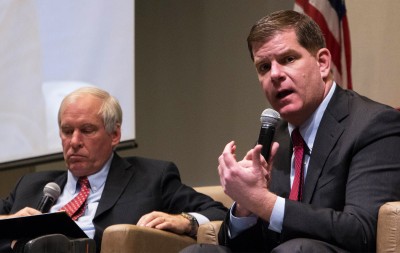Four mayors, including Boston Mayor Martin Walsh, gathered Sunday for a panel entitled “Municipal Strategies for Financial Empowerment” at the University of Massachusetts Boston, to speak about wage inequality and financial literacy throughout the country and suggest proposals for solving such problems.

Joining Walsh, on the panel were New York City Mayor Bill de Blasio, Seattle Mayor Ed Murray and Baltimore Mayor Stephanie Rawlings-Blake.
All four panelists advocated for a united front when tackling major issues plaguing their respective cities, which ranged from income inequality to homelessness to literacy. Murray said in panel the federal government agenda and cohesive strategies are going to be vital to tackling issues in the future.
“We are coming very close, and a lot of the language I hear around the country to thinking that the federal government getting out of the way is the answer, it is not the answer, folks,” Murray said in the panel. “We need somehow to build coalitions with people who are not like us, who are mostly not from our parties. Without that, we can move the needle on income and equality a little bit. We can move the needle on homelessness a little bit, but it’ll only be a little bit.”
Walsh called this a “multi-pronged approach,” and called upon the legislature and elected officials to look closely at the current status of cities while making decisions that will affect the future.
“It can’t just be one. It can’t just be the legislature doing a minimum wage increase and the state doing something and the city doing something else. It has to be a collaboration,” Walsh said. “We need help from the legislature to give us the relief that’s out there. So it really is coming up with a plan and having a buy-in from all the elected officials, including the business and the private sector.”
Rawlings-Blake said in the panel that tough decisions need to be made to achieve optimal functionality of cities, through tools such as direct feedback.
“One of the things that I’m working on is fine-tuning that process to get a better sense of ‘yes we did this, and in 48 hours, we got this done,’ but is this truly providing the service that our citizens want? Is this how they really want us to prioritize our spending?” Rawlings-Blake said. “I’m looking forward to crystallizing our priorities around outcomes based on the feedback directly from the rest of it.”
The most prominent issue brought forth by the panelists which plagues their respective cities was income inequality and the issues that inevitably stem from it, such as homelessness and poverty. De Blasio said in the panel that the current instability of the middle class has resulted in more and more people experiencing poverty.
“I think it’s also important to talk about the middle class that is and the middle class that was. The middle class that was, not so long ago in America, had a relatively high level of stability and assurance about what a middle class lifestyle meant and that it could be passed onto the next generation,” de Blasio said. “A lot of times in the past, when we talked about poverty, a lot of people in this country said ‘Oh, that’s about someone else.’ Well, now it’s not about someone else. It’s actually a reality that’s affecting more and more people.”
He said small, widespread changes would make the difference in eradicating poverty.
“Every time we get someone a bank account who hadn’t had one, that’s a step in the right direction,” de Blasio said. “People are hungry for it. They’re hungry for these opportunities.”
The panel concluded with all four mayors emphasizing the need for change.
Several attendees said they appreciated the open forum for discussing certain issues within the government.
Robert MacEachern, 39, of Dorchester, said he attended to hear how mayors are addressing systemic problems in their respective cities.
“It’s interesting hearing them sharing ideas to combat a lot of the same issues and challenges,” he said. “It’s good that in Boston, we have a mayor that’s progressive and he’s looking at different ways of dealing with problems versus the way that they’ve done in the past.”
Bruce Marks, 59, CEO of Neighborhood Assistance Corporation of America, said the mayors at Sunday’s panel are doing much more than others around the country.
“These are the good guys. These are progressives. These are the guys that are pushing it,” he said. “I think you go downhill to some extent when you talk about some of the other players around the country and certainly when you talk about the federal government.”
Mimi Turchinetz, campaign director at the Boston Earned Income Tax Credit Coalition, said the conversation on collaboration and challenge to the business community is important.
“I do work in this field. I work for Mayor Walsh, and I have been very active in building out the issues and creating the office of financial empowerment in the city,” she said. “It’s pretty clear that there’s a lot of folks that are engaged and want to do something. The conversation on collaboration and the challenge to the business community that Mayor de Blasio put forth is really important.”























































































































